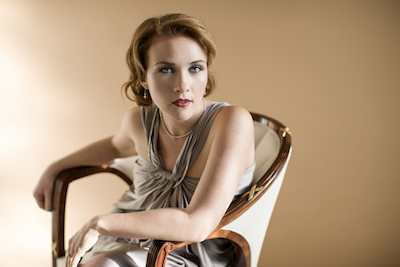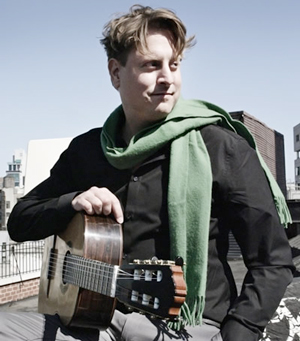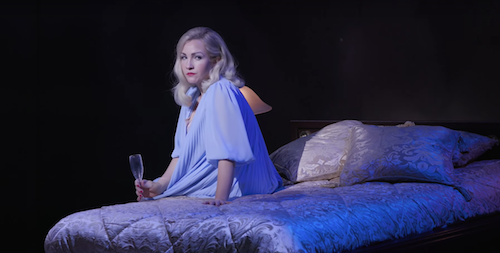by Jarrett Hoffman

The pair of Grammy winners will get that chance this May. They’ll head to the University of California, Davis for a performance on Friday, then cross the country to Plymouth Church in Shaker Heights for a joint recital on Tuesday, May 8 at 7:30 pm.
The program of Spanish and American music is co-presented by Cleveland’s Classical Guitar and Chamber Music Societies (CCGS and CCMS). ClevelandClassical.com’s own Daniel Hathaway will give a pre-concert lecture at 6:30 pm.
“We’ve been working on this for years, so it’s long in coming,” Sasha Cooke said during a phone call. “I’m glad it finally worked out. It’s really beautiful music, and Jason’s a phenomenal guitarist.”
Cooke was in Dallas, where she would solo in Maurice Duruflé’s Requiem with the Symphony — sans music director, after Jaap van Zweden flew to Amsterdam last-minute for dental surgery. “I’m working with his right-hand person, assistant conductor Ruth Reinhardt, who’s wonderful,” Cooke said. “But I’m sad not to work with Jaap. I think he’s tremendous, and it will be great to see how things develop with the New York Phil. I’m looking forward to working with him there.”
The Dallas trip also brought the mezzo-soprano back to her home state — after she soloed the weekend before with the New Zealand Symphony on their home turf. Cooke is a native of College Station, studied at Rice University (and Juilliard), and lives in the Woodlands suburb north of Houston. “It’s perfect because it’s only an hour away from College Station, whereas Houston’s a bit farther,” she said. “And I’m north of the airport, so I don’t have to deal with the craziness of typical Houston traffic.”

But other aspects of singing largely carry over. “It’s a really common misconception that singers change their approach based on the repertoire,” she said. “People ask that question sometimes about Broadway and opera, and it’s subtle. I’d say it has more to do with inflection, characterization, and interpretation than vocal technique.”
The Spanish and American songs on the duo’s program brought up another comparison. “They actually have a lot in common, I’d say, because so much of the song repertoire is in some way related to love. The Spanish songs maybe moreso — and typical of Spanish culture, everything is a little bit more fiery, a little bit more passionate, and a little bit more sappy,” she said. Another point of overlap the singer pointed out: true to their titles, both Manuel de Falla’s Siete canciones populares españoles and the selections from Aaron Copland’s Old American Songs are based in folk songs.
Cooke drew a connection between the Spanish/American repertoire and the culture of California, where they’ll perform on Friday. “I feel like these days, we have to have more to say than just playing beautiful music,” she said. “I want to embrace other cultures, and I feel like that’s part of our thematic content: here’s what we have as Americans that’s really unique, and here’s something else that’s not American but that we relate to as part of our fabric.”
The Leonard Bernstein centennial played a part in choosing his songs “Who Am I,” “Somewhere,” and “Conga” from Peter Pan, West Side Story, and Wonderful Town. “I also think they work surprisingly well with guitar,” Cooke said. “Part of the conversation about programming had to do with arrangements — which worked best, which didn’t.”
Two arrangements that fit perfectly were the selections from Enrique Granados’ 12 Tonadillas al estilo antiguo and the de Falla, as both composers imitated the guitar in their original versions for voice and piano. “The other songs were more of a question mark, but I’m happy that the Copland worked.”
The singer pointed to Copland as an example of what America uniquely offers to the musical landscape. “There’s sort of a populist simplicity to his music, where the melody is just beautiful, and you understand everything about the text.” That makes for a great combination with guitar, an instrument Cooke associates with Americana. “It’s hard to find the right word for it, but no one’s going to come to a guitar concert and feel intimidated, like they might if they saw a violin with three concertos on the program,” she said.
For his solo portions, Vieaux will sandwich two works by Isaac Albéniz — Rumores de la Caleta and Torre Bermeja — around Francisco Tárrega’s Capricho Arabe on the Spanish half of the program. On the American side, he’ll slip Pat Metheny’s Always and Forever between the Copland and Bernstein.
Cooke and I closed our conversation discussing an important moment earlier in her season: singing the title role in the world premiere of Nico Muhly’s opera Marnie at English National Opera. The work is one of a few adaptations of Winston Graham’s 1961 novel of the same name — including the film by Alfred Hitchcock.
“It’s so fascinating,” Cooke said. “I almost took the job because of the role and the character development more than anything else, and of course working with Nico. Marnie is just very multi-faceted. There are a lot of subtleties, a lot of complexities, and a lot of unknowns about her. I think the reason that she was so interesting for the author and for Alfred Hitchcock, and in this case Nico, is that she is an anomaly.”
The story — which includes embezzlement, changes of identity, blackmail, deep psychological trauma, and an ambiguous ending — is just as fascinating and elusive as the character. “There are so many question marks, which I think is the beauty of the content,” Cooke said. “So much is absolute in opera. Man wants woman, man conquers, blah blah blah. This is so much more nuanced, which is very much like Nico’s style.”
Though she saw Hitchcock’s movie, she put it out of her head, not wanting it to steer her interpretation. “And a movie is so different from an opera, because the person who’s really acting, in a sense, is the director — choosing which shots say what. Sometimes you just see a hand, a purse, or an eye. With opera so many things are happening at once, so your feeling and your action in a scene are much more self-driven as opposed to shot-driven.”
Cooke spent quite a bit of time with the text, treating it like a script. “The libretto is almost as amazing as a theater piece as it is an opera piece,” she said. “It was thrilling to have great music, great subject matter, great text, and a great role. And it was one of the first times I felt a lot of ownership over something.”
Part of that was from being onstage nearly the entire opera. “I had thirteen quick changes on the sides of the stage,” Cooke said. “I didn’t even see my dressing room. Even at intermission, I barely had time to use the restroom because I was changing into an Act 2 outfit. So it was an intense roller coaster, and I just had to suck it up and jump on.”
Top photo by Dario Acosta
Published on ClevelandClassical.com May 1, 2018.
Click here for a printable copy of this article



